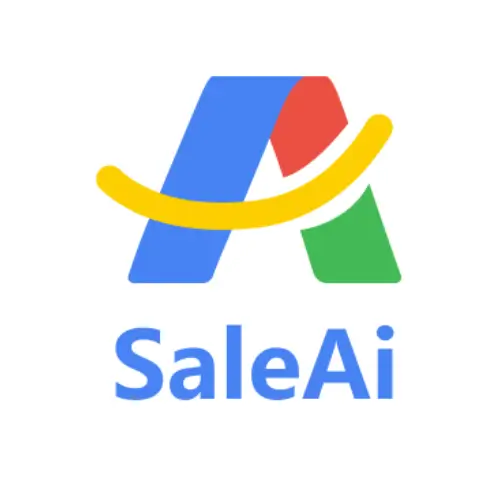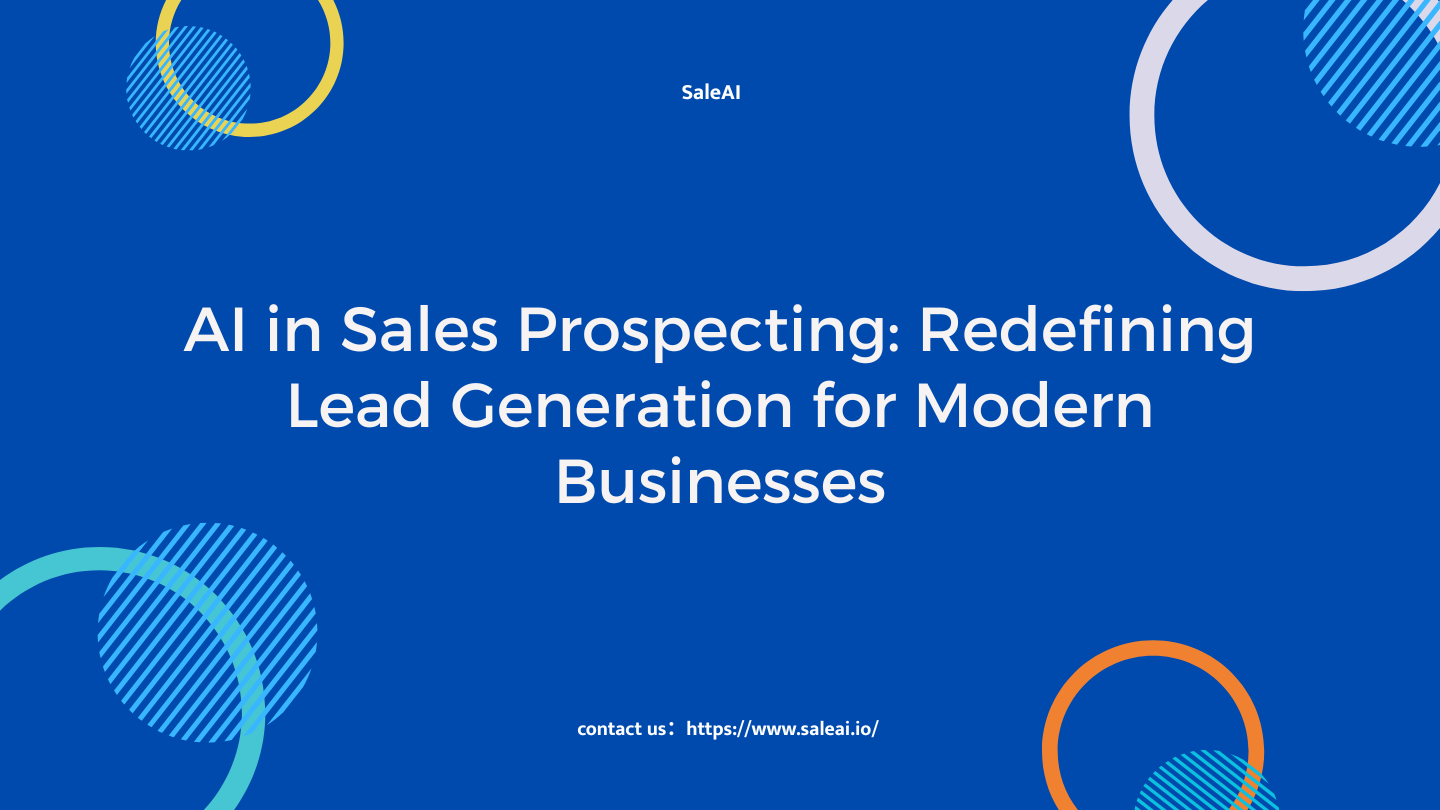Introduction:
In the competitive landscape of modern business, sales prospecting is no longer about casting a wide net and hoping for the best. It’s about precision, efficiency, and identifying the right opportunities at the right time. Traditional prospecting methods, however, are time-consuming, prone to errors, and often fail to provide actionable insights.
This is where artificial intelligence (AI) in sales prospecting comes into play. AI-driven tools have redefined how businesses approach lead generation, making it possible to pinpoint high-value prospects, automate outreach, and optimize conversion efforts—all with unparalleled accuracy.
In this article, we’ll examine the role of AI in modern sales prospecting, its operational advantages, and how SaleAI empowers businesses with cutting-edge solutions to streamline their processes.
The New Era of Sales Prospecting: AI at the Helm
AI in sales prospecting leverages machine learning, natural language processing (NLP), and data analytics to uncover, analyze, and act on potential leads. Unlike traditional methods that rely on labor-intensive cold calls or email campaigns, AI tools sift through massive datasets to find leads that align with your ideal customer profile (ICP).
Here’s what sets AI-driven sales prospecting apart:
a. Data-Driven Identification of Ideal Prospects
AI tools analyze firmographic, demographic, and behavioral data to identify prospects that match your ICP. This includes:
- Industry, company size, and revenue.
- Decision-maker roles and contact information.
- Engagement patterns, purchase intent, and online behavior.
b. Automation of Repetitive Tasks
AI automates time-consuming tasks such as:
- Lead list generation.
- Email outreach setup.
- Data entry and CRM updates.
This allows sales teams to focus on high-value activities like closing deals and relationship building.
c. Real-Time Insights
AI tools provide real-time updates on prospects, including:
- Changes in job roles or company structure.
- Signals indicating a need for your product or service.
- Competitor activities that may open up opportunities.
Core Benefits of AI in Sales Prospecting
a. Increased Efficiency
AI-driven tools dramatically reduce the time spent on manual prospecting tasks. By automating lead generation and qualification, sales teams can focus on converting leads rather than finding them.
b. Better Lead Quality
AI doesn’t just generate more leads; it generates better ones. By analyzing multiple layers of data, AI ensures that your sales team targets prospects who are most likely to convert, improving overall ROI.
c. Enhanced Personalization
AI tools provide granular insights into each prospect, enabling highly personalized outreach. For example, your team can send emails tailored to a prospect’s specific challenges or highlight how your solution aligns with their business goals.
d. Reduced Human Error
Manual data entry and prospecting are prone to errors, such as duplicate records or missed opportunities. AI eliminates these issues by ensuring data accuracy and completeness.
e. Scalability
Whether you’re targeting 100 prospects or 10,000, AI-powered prospecting tools scale effortlessly, making it easier to expand into new markets or industries.
AI-Powered Prospecting in Action: Key Features
a. Predictive Lead Scoring
AI analyzes historical data and current engagement metrics to score leads based on their likelihood of conversion. This ensures sales teams prioritize high-value opportunities.
b. Behavioral Tracking and Analysis
AI tools track and analyze prospect behavior, such as:
- Website visits and page views.
- Email opens, clicks, and responses.
- Social media interactions.
This data helps sales teams understand where a prospect is in their buying journey and what type of content they are most likely to engage with.
c. Intelligent Outreach Recommendations
AI tools provide actionable recommendations for outreach, such as:
- The best time to contact a prospect.
- Preferred communication channels (e.g., email, phone, LinkedIn).
- Messaging suggestions based on the prospect’s pain points or interests.
d. Automatic Data Enrichment
AI integrates with your CRM to fill in missing details about prospects, such as:
- Updated job titles and roles.
- Contact information like email addresses and phone numbers.
- Company details, including revenue, employee count, and industry.
e. Competitor and Market Insights
AI monitors market trends and competitor activities to identify new opportunities. For example, if a competitor’s client expresses dissatisfaction on social media, AI tools can flag this as a potential lead.
How SaleAI Drives Sales Prospecting Excellence
SaleAI is at the forefront of AI-powered sales prospecting, offering businesses the tools they need to identify, qualify, and engage high-value leads effectively. Here’s how SaleAI stands out:
a. Global Data Coverage
SaleAI integrates data from millions of LinkedIn profiles, CRM systems, and company databases to provide comprehensive insights into prospects across industries and regions.
b. Advanced AI Algorithms
SaleAI’s machine learning models analyze vast amounts of data to predict which leads are most likely to convert. This includes:
- Scoring leads based on engagement and intent signals.
- Highlighting high-priority opportunities in real-time.
c. Seamless CRM Integration
SaleAI connects seamlessly with popular CRM platforms like Salesforce and HubSpot, automatically syncing enriched prospect data and activity history.
d. Customizable Prospecting Workflows
With SaleAI, businesses can design prospecting workflows tailored to their unique needs, including:
- Automated email campaigns with personalized messaging.
- Follow-up reminders based on prospect activity.
- Dynamic lead segmentation for targeted outreach.
e. Real-Time Alerts
Stay ahead of the competition with SaleAI’s real-time alerts, which notify your team about:
- Changes in a prospect’s job role or company status.
- New buying signals or intent indicators.
- Opportunities to engage based on competitor activity.
Rethinking Prospecting: A Real-World Example
Challenge:
A B2B SaaS company struggled to generate quality leads and often wasted time on prospects that didn’t fit their ICP.
Solution:
After implementing SaleAI’s prospecting tools, they achieved the following:
- 80% reduction in time spent on manual lead research.
- 50% increase in lead quality due to predictive scoring.
- Personalized outreach campaigns that boosted email response rates by 35%.
Steps to Implement AI in Sales Prospecting
- Define Your ICP: Clearly outline the characteristics of your ideal customers, including industry, company size, and pain points.
- Integrate Your Data Sources: Ensure your CRM, marketing tools, and sales platforms are interconnected for seamless data flow.
- Select an AI Tool: Choose a solution like SaleAI that offers advanced prospecting features and CRM integration.
- Train Your Team: Provide training on how to interpret AI-driven insights and incorporate them into the sales process.
- Measure and Optimize: Continuously monitor key metrics, such as lead conversion rates and email engagement, to refine your prospecting strategy.
The Future of AI in Sales Prospecting
The adoption of AI in sales prospecting is only set to grow, with advancements in:
- Hyper-Personalization: Delivering even more tailored experiences based on deeper data insights.
- Voice and Chat AI: Engaging prospects through AI-powered voice assistants and chatbots.
- Predictive Market Analysis: Anticipating shifts in market dynamics to stay ahead of competitors.
By embracing AI-driven prospecting tools like SaleAI, businesses can future-proof their lead generation strategies, ensuring sustainable growth and competitive advantage.





